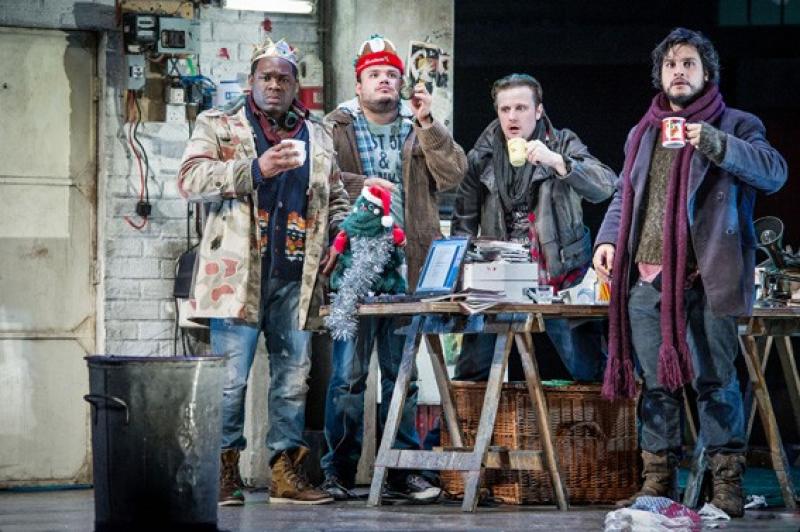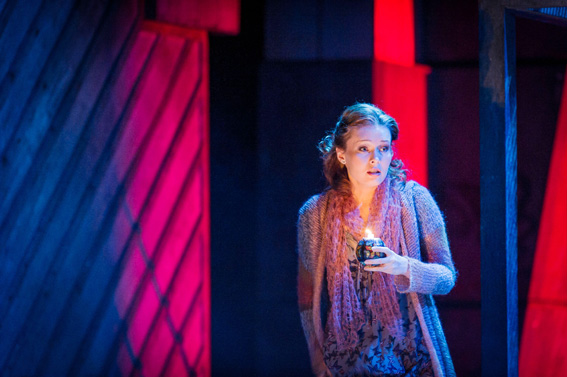La Bohème, Glyndebourne Festival Opera | reviews, news & interviews
La Bohème, Glyndebourne Festival Opera
La Bohème, Glyndebourne Festival Opera
An efficient but less than involving production of David McVicar's vision of love among the artists

It has romantic sweep but is held firm by zealous attention to detail and while it’s hugely expansive of gesture, it’s never generalised. I’m talking about Kirill Karabits’ conducting of La bohème at Glyndebourne. I wish I could say the same for the production.
If David McVicar’s vision of love among the artists had punch on its first outing in 2000, something has been lost in the translation. Lest we forget that Rodolfo and his chums are unsuccessful, the contemporary setting is self-consciously drab – presumably to support Puccini’s exploration of verismo and off-set the passion of his music. The visual exception to the wearyingly earnest tone is the suitably gaudy, neon-style scene of bohemian life at Cafe Momus which closes with fire-eaters and flames rippling down the edges of an anodyne metal walkway. But in this incarnation the opera itself fails to catch fire or, indeed, to elicit tears.
Is strength really the quality you dream of in Puccini’s consumptive heroine?
The biggest surprise of the opening night came at the curtain call where David Lomeli (Rodolfo) picked up Ekaterina Scherbachenko (his Mimi) and, to their evident delight, swung her around before taking their bows. Nothing wrong with that display of joy – they’re both making their Glyndebourne debuts – but that was the most relaxed, connected and spontaneous that the two of them had been all night.
Technically, both of them put in clean vocal performances. Lomeli’s voice is not big – he cannot ride the orchestra at the climaxes – but there’s a shiny ring on his well-supported, bright tenor sound that nicely suggests the ardour of youth. And Scherbachenko (pictured below right) has an evenly produced and much stronger voice than her ideally gaunt figure would suggest. But is strength really the quality you dream of in Puccini’s consumptive heroine? More problematically still, for all the quality of their voices, for most of the evening it feels as if these two are singing at rather than with each other.
 It’s clear that they have paid close attention to revival director Lee Blakeley but the results are on the dutiful side. Their angst-filled looks and singing display the required emotions but you never feel involved because the dramatic impulse that should drive them is missing. Mimi admits to Marcello in the third act that Rodolfo, torn apart by jealousy, wants to throw her out. But it’s impossible to square that with Lomeli who is much given to standing around with his hands jammed into his jeans pockets.
It’s clear that they have paid close attention to revival director Lee Blakeley but the results are on the dutiful side. Their angst-filled looks and singing display the required emotions but you never feel involved because the dramatic impulse that should drive them is missing. Mimi admits to Marcello in the third act that Rodolfo, torn apart by jealousy, wants to throw her out. But it’s impossible to square that with Lomeli who is much given to standing around with his hands jammed into his jeans pockets.
It’s unfortunate that his awkwardness is thrown into stark relief by the relaxed, powerful presence of Andrei Bondarenko as Marcello. It was clear at the 2011 Cardiff Singer of the World (he deservedly ran away with the Song Prize) that he is a wonderfully expressive singer with a thrillingly unforced sound. What you could only guess at in competition was that he can really act.
Unlike Lomeli, Bondarenko never looks like he’s trying and that lack of strain makes him completely engaging. He never indulges in scene-stealing but it’s hard not to prefer watching him and listening to the sheer richness of his lush baritone sound, especially since he’s singing opposite the highly effective Musetta of Irina Iordachescu.
Musettas tend to be overly bright and brittle, a notion unnecessarily underlined by her sparkly, figure-hugging, consciously tacky costume. But Iordachescu is much better than that. She has all the requisite coloratura and spirited flouncing for Puccini’s flirt, but with an intriguingly hooded sound. Up against Scherbachenko’s more unyielding tone, hers is more textured and considerably warmer.
Opera snobs like little better than to write Puccini off as too vulgar
The lack of heat overall, however, is equally attributable to the design. Michael Vale’s set is indicative of a milieu – it’s centred around a severely run-down workshop/living space – but not only is the logic of the space confusing, the scale feels awkward. The small central set piece looks so marooned in its surrounding space that the atmosphere created by the singers is drained of energy. As a result, most of the night’s excitement comes from the pit.
Karabits’ tempi are defiantly on the expansive side, but that’s partly because he is investigating the textures in order to make Puccini’s detailing audible. Opera snobs like little better than to write Puccini off as too vulgar, not least for his predilection for upholstering vocal melodies with plush string support. But Karabits recognises him as an enviable musical dramatist – contemporary composers/librettists listen and learn – whose orchestral writing seethes with purposeful use of colour.
In the wintry third act, famously ushered in with minor-key flute and harp, Karabits spotlights the London Philharmonic Orchestra’s lead flautists and harpist. That highly evocative chill is typical of the exquisite, precise playing he coaxes from the players. It is, of course, right that you emerge from the opera singing Puccini’s praises. If only that were because of rather than in spite of the efficient but less than involving production.
Explore topics
Share this article
Add comment
The future of Arts Journalism
You can stop theartsdesk.com closing!
We urgently need financing to survive. Our fundraising drive has thus far raised £49,000 but we need to reach £100,000 or we will be forced to close. Please contribute here: https://gofund.me/c3f6033d
And if you can forward this information to anyone who might assist, we’d be grateful.

Subscribe to theartsdesk.com
Thank you for continuing to read our work on theartsdesk.com. For unlimited access to every article in its entirety, including our archive of more than 15,000 pieces, we're asking for £5 per month or £40 per year. We feel it's a very good deal, and hope you do too.
To take a subscription now simply click here.
And if you're looking for that extra gift for a friend or family member, why not treat them to a theartsdesk.com gift subscription?
more Opera
 La bohème, Opera North review - still young at 32
Love and separation, ecstasy and heartbreak, in masterfully updated Puccini
La bohème, Opera North review - still young at 32
Love and separation, ecstasy and heartbreak, in masterfully updated Puccini
 Albert Herring, English National Opera review - a great comedy with depths fully realised
Britten’s delight was never made for the Coliseum, but it works on its first outing there
Albert Herring, English National Opera review - a great comedy with depths fully realised
Britten’s delight was never made for the Coliseum, but it works on its first outing there
 Carmen, English National Opera review - not quite dangerous
Hopes for Niamh O’Sullivan only partly fulfilled, though much good singing throughout
Carmen, English National Opera review - not quite dangerous
Hopes for Niamh O’Sullivan only partly fulfilled, though much good singing throughout
 Giustino, Linbury Theatre review - a stylish account of a slight opera
Gods, mortals and monsters do battle in Handel's charming drama
Giustino, Linbury Theatre review - a stylish account of a slight opera
Gods, mortals and monsters do battle in Handel's charming drama
 Susanna, Opera North review - hybrid staging of a Handel oratorio
Dance and signing complement outstanding singing in a story of virtue rewarded
Susanna, Opera North review - hybrid staging of a Handel oratorio
Dance and signing complement outstanding singing in a story of virtue rewarded
 Ariodante, Opéra Garnier, Paris review - a blast of Baroque beauty
A near-perfect night at the opera
Ariodante, Opéra Garnier, Paris review - a blast of Baroque beauty
A near-perfect night at the opera
 Cinderella/La Cenerentola, English National Opera review - the truth behind the tinsel
Appealing performances cut through hyperactive stagecraft
Cinderella/La Cenerentola, English National Opera review - the truth behind the tinsel
Appealing performances cut through hyperactive stagecraft
 Tosca, Royal Opera review - Ailyn Pérez steps in as the most vivid of divas
Jakub Hrůša’s multicoloured Puccini last night found a soprano to match
Tosca, Royal Opera review - Ailyn Pérez steps in as the most vivid of divas
Jakub Hrůša’s multicoloured Puccini last night found a soprano to match
 Tosca, Welsh National Opera review - a great company reduced to brilliance
The old warhorse made special by the basics
Tosca, Welsh National Opera review - a great company reduced to brilliance
The old warhorse made special by the basics
 BBC Proms: The Marriage of Figaro, Glyndebourne Festival review - merriment and menace
Strong Proms transfer for a robust and affecting show
BBC Proms: The Marriage of Figaro, Glyndebourne Festival review - merriment and menace
Strong Proms transfer for a robust and affecting show
 BBC Proms: Suor Angelica, LSO, Pappano review - earthly passion, heavenly grief
A Sister to remember blesses Puccini's convent tragedy
BBC Proms: Suor Angelica, LSO, Pappano review - earthly passion, heavenly grief
A Sister to remember blesses Puccini's convent tragedy
 Orpheus and Eurydice, Opera Queensland/SCO, Edinburgh International Festival 2025 review - dazzling, but distracting
Eye-popping acrobatics don’t always assist in Gluck’s quest for operatic truth
Orpheus and Eurydice, Opera Queensland/SCO, Edinburgh International Festival 2025 review - dazzling, but distracting
Eye-popping acrobatics don’t always assist in Gluck’s quest for operatic truth

Comments
I think you went to another
Musically and dramatically
I'm sympathetic to Briggs'